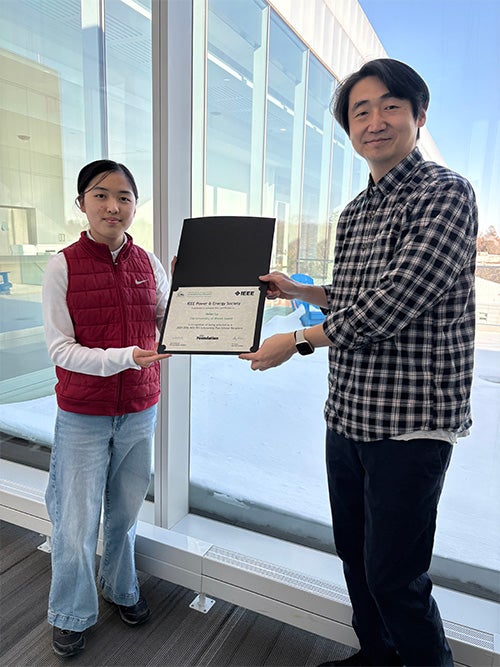University of Rhode Island computer and electrical engineering sophomore Helen Ly ’28, of Providence, Rhode Island, was awarded an Institute of Electrical and Electronics Engineers Power and Energy Society scholarship for 2026.

Two hundred forty-four PES scholars were selected this year across the U.S., Canada and Latin America. These undergraduate students are majoring in one of the IEEE designated fields, are high achievers with strong grade-point averages with distinctive extracurricular commitments and are committed to exploring the power and energy field. In addition to financial support, the program connects scholars with industry internships, professional mentoring, and leadership development opportunities.
“I’m very honored to have received this award and couldn’t have done it without my mentors here at URI,” said Ly. “I’m excited to see how this opportunity will shape my future career goals and path.”
Ly conducts undergraduate research in assistant professor Yeonho Jeong’s Power Electronics Lab. “She is a bright and diligent student who consistently contributes to the University of Rhode Island and the URI Power Electronics Laboratory through her commitment to research excellence,” said Jeong. “Helen joined the lab in her freshman year and has since been actively engaged in research in the power and energy field, with a particular focus on electric design automation. Her work has been supported by the URI Navy STEM program.”
“I am very grateful that Professor Jeong took me under his wing. He allowed me to learn more about my first major, computer engineering, in-depth, focusing on hardware, machine learning, and its current applications in power electronics,” said Ly.
Her research has helped her to realize her interest in energy systems, specifically energy grids and renewables for sustainability. She intends to pursue a master’s degree following graduation to continue research experiences and/or internships focused on energy grids or power electronics. “The PES Scholarship is a great opportunity to network with other great minds, and I hope I can leverage that to help me learn more about how these industries are currently operating, and what their future outlooks are,” said Ly.
Ly is an active member of multiple student organizations including the Institute of the Electrical and Electronics Engineers, the Society of Hispanic Professional Engineers, and serves as a resident academic mentor for housing and residential life and an ambassador for the College of Engineering.
Her advice for future engineers? “Do not be afraid to ask questions and meet with professors and other researchers. You’ll never know where a conversation will lead you,” she said. “Who knows, maybe you’ll also find the field that you love!”
